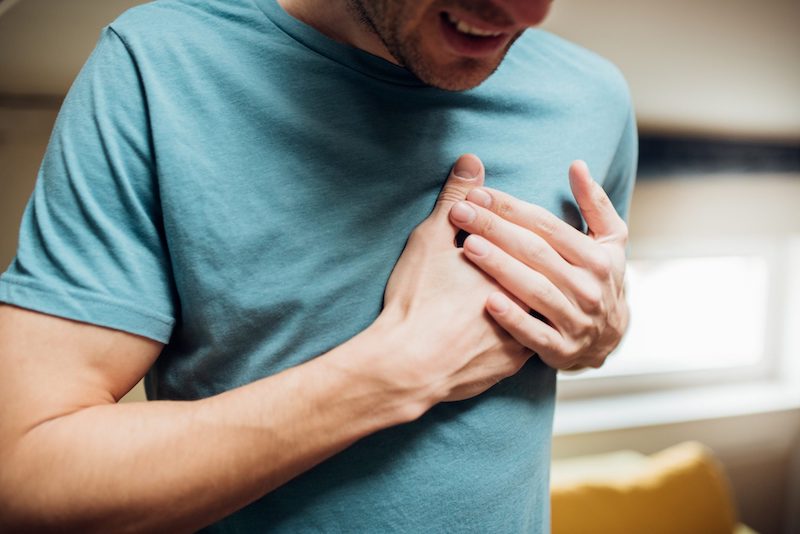What Causes a Heart Attack at a Young Age?

December 22, 2019
Updated: 01/27/2022
When 34-year-old Przemyslaw “Simon” Blazejowicz suffered a heart attack in February 2019, doctors at JFK Medical Center were initially puzzled why such a young man—who also worked out six days a week—would fall among the tiny percentage of Americans under age 40 stricken by heart attacks each year.
It turns out that Simon’s strong family history of heart disease, including an often-genetic condition that makes blood clot more rapidly, placed him in the top two risk factors for an early heart attack. The other leading risk factor for heart attacks in people under 40 is substance abuse, especially cocaine, says Saleem Husain, M.D., director of the Cardiac Catheterization Lab and Chest Pain Center at JFK, who successfully treated Simon.
Heart Attack Stats
- 735,000 Americans have a heart attack annually
- Cardiovascular disease remains the leading cause of death in the U.S.
- Only about 0.3 percent of men and women between ages 20 and 39 experience a heart attack
- The average age of a first heart attack is 65 for men and 72 for women
Alarming New Trend
“I only see a very young patient with a heart attack probably once or twice a year,” says Dr. Husain. “It’s very rare.”
But research, presented at the 2019 conference of the American College of Cardiology, spotlights an alarming trend: a rising incidence of heart attacks in younger adults. The study was the first to compare “young” heart attack survivors (41 to 50 years old) to “very young” survivors (age 40 or younger). The proportion of under-40 adults having a heart attack rose by 2 percent a year for the last 10 years.
Key Risk Factors
Key risk factors of having a heart attack at a young age include:
- Substance abuse or excessive alcohol use
- Smoking
- High blood pressure
- High cholesterol levels
- Lack of physical activity
- Diabetes
- Poor diet
Obesity doesn’t usually contribute greatly to this risk, despite it upping the odds for people over 50, Dr. Husain notes.
Nearly half of Americans have at least one of the key risk factors for heart disease, according to the Centers for Disease Control and Prevention.
“People don’t usually have heart disease in their thirties, but they should be aware,” Dr. Husain says. “If you start managing your health in your thirties and watching your blood pressure, cholesterol and blood sugar levels, hopefully you won’t have problems when you’re older.”
Next Steps:
- Meet our clinical contributor: Saleem Husain, M.D.
- To make an appointment with Dr. Husain or a doctor near you, call 800-822-8905 or visit our website.
- Learn more about our Keeping America Safe program.
The material provided through HealthU is intended to be used as general information only and should not replace the advice of your physician. Always consult your physician for individual care.
Sources:
American College of Cardiology 2019 study
Find a doctor near me
Is it a Heart Attack? Watch for These Less Common Signs

You may know chest pain, tightness and pressure are classic clues of a heart attack, but a wide range of equally concerning symptoms don’t fall under these “textbook” heart attack signs,
Can COVID-19 Cause a Heart Attack?

COVID-19 may harm your heart. Learn about related heart attack risks and symptoms from Dr. Landers. Get care now if needed. Call 800-822-8905.
Find a doctor near me

Surprising Signs You May Be Having a Heart Attack
Recognize surprising heart attack signs. Dr. Astudillo explains symptoms & importance of immediate care. Call 800-822-8905 now.

What Does a Cardiac Stress Test Reveal?
Learn about cardiac stress tests. Understand how this common heart assessment works and what it reveals about your heart health. Consult your doctor.

Should You Get a Cardiac Calcium Scan?
Cardiac Calcium Scan: Understand your heart health risks. Learn about this painless procedure & its benefits from Southern Ocean Medical Center's Dr. Gill. Schedule a consultation today.

6 Proven Ways to Lower Your Resting Heart Rate
Lower your resting heart rate with 6 proven ways. Dr. Timmapuri offers expert advice. Learn more and schedule an appointment today.

